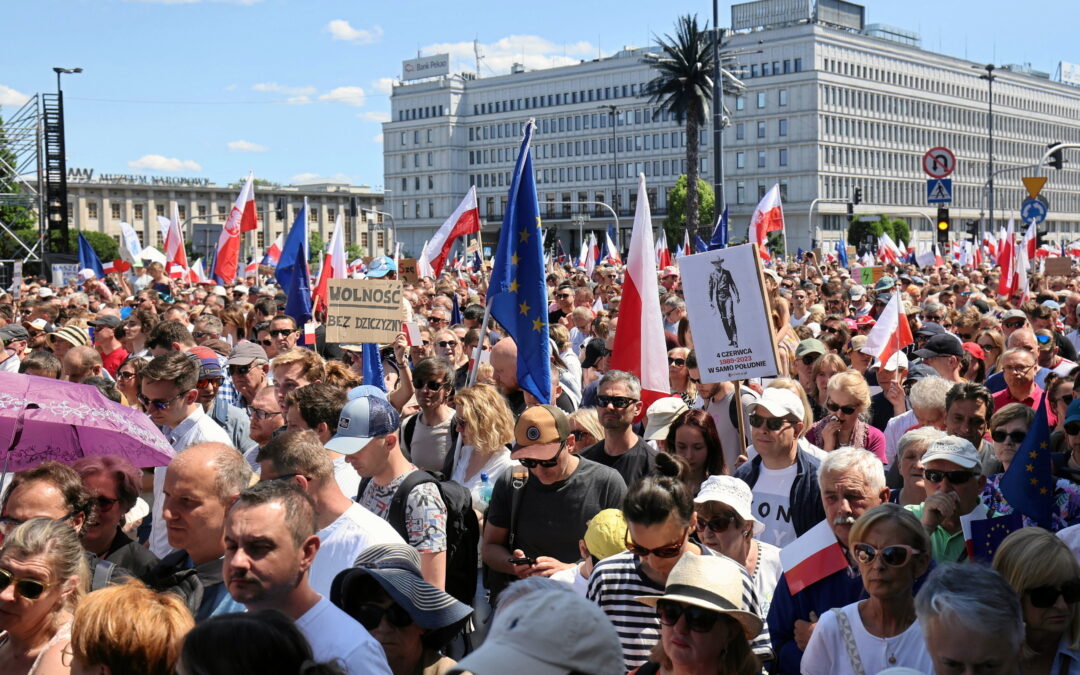Hundreds of thousands of people have joined marches against Poland’s national-conservative ruling Law and Justice (PiS) party, in the country’s largest demonstrations since mass protests against the introduction of a near-total ban on abortion in 2020.
At the main march in Warsaw alone, half a million people attended, according to an initial estimate by city hall, which is under opposition control. Analysis of aerial images by Onet, a leading news website, suggested that at least 300,000 were present.
Amid a red, white and blue sea of Polish and European flags, participants waved banners blaming PiS for soaring inflation and accusing it of nepotism, corruption and destroying democracy. PiS has condemned the event as a “march of hate”.
Tej fali już nic nie zatrzyma✌️🇵🇱#Marsz4czerwca #PolskaWNaszychSercach pic.twitter.com/jaaqJrJaU7
— PlatformaObywatelska (@Platforma_org) June 4, 2023
“Destroying the law, ignoring the constitution – that’s what mobilised us,” Marek, 51, told Notes from Poland at the march in Warsaw. “People have had enough. This scale of thievery, corruption…this is not a normal country, this is some kind of banana republic.”
The protests come ahead of parliamentary elections due to take place this autumn, and have been supported by all major opposition parties. “We will win,” chanted the crowds in Warsaw, where hundreds of specially organised buses had brought in protesters from around the country this morning.
The march was held today, on 4 June, because it is the anniversary of the partially free elections in 1989 at which the success of the Solidarity movement led by Lech Wałęsa paved the way for the end of Poland’s communist regime.
Speaking to several participants in today's protests, some undertones were repeated by almost every one of them. Speaking of their own feelings they would describe "fatigue", while speaking about government policies they would use words such as "arrogance", and "hypocrisy" 1/ pic.twitter.com/zl5DTDPhJn
— Alicja Ptak (@AlicjaPtak4) June 4, 2023
At noon, Donald Tusk – leader of Civic Platform (PO), the largest opposition party – appeared on stage to address the crowd. He was joined by Wałęsa as well as Warsaw’s mayor, Rafał Trzaskowski, who is deputy leader of PO.
“As I look here today, in the centre of Warsaw, at the endless crowds of people who came here to manifest their anger, but also their hope, I want to say that for a long time I haven’t thought that the words ‘this is Poland’ so perfectly fit a time and a place,” said Tusk.
“We are here today so that all of Poland, all of Europe and the whole world can see how strong we are and how many of us are ready to fight again for democracy and a free Poland,” he continued.
💬 Przewodniczący @donaldtusk rozpoczyna #Marsz4czerwca 🇵🇱✌️
Jestem dumny i szczęśliwy, że mogę dzisiaj tu, w Warszawie, powiedzieć: ZWYCIĘŻYMY!#PolskaWNaszychSercach pic.twitter.com/0HMbaFYzYN
— PlatformaObywatelska (@Platforma_org) June 4, 2023
While Tusk has been the figurehead of the march, he called on all democratic opposition groups to join. Among those to quickly heed the call was The Left (Lewica), the second-largest opposition group in parliament.
The other main opposition force – a recently formed centre-right alliance between Poland 2050 (Polska 2050) and the Polish People’s People (PSL) – had initially avoided offering their support.
However, on Tuesday this week, they announced that they would join the march, saying that a recently passed law creating a commission that can ban individuals from holding public office – which the opposition says will be used against them by PiS – was the final straw.
The US and EU have expressed concern over Poland's new commission to investigate Russian influence, which can ban individuals from public office.
The US says it could be "misused to interfere with elections" by "blocking opposition politicians' candidacy" https://t.co/1MGt53XXWT
— Notes from Poland 🇵🇱 (@notesfrompoland) May 30, 2023
Another protester in Warsaw, Witosława Dębińska, 39, told Notes from Poland that, she is “sick of them [PiS] breaking the law and taking away rights, taking away of women’s rights…And now the elections are at risk because you can shut down your opponent and PiS thinks it’s ok.”
Outside the capital, protests took place in towns and cities around the country, as well as some in cities abroad, including Berlin, London and Paris, with others planned in Chicago and New York.
In Kraków, Poland’s second largest city, images show large numbers of people filling the market square, with one banner declaring: “Down with the duck dictator.” The word for duck (kaczor) is a derisive nickname for PiS chairman Jarosław Kaczyński
#krakow #4czerwca #marsz4czerwca pic.twitter.com/8ZrT5uCgFU
— Marcin Zięba (@ziebam) June 4, 2023
Ahead of the march, PiS had criticised the event. In a video published yesterday, it accused the opposition of hypocrisy, pointing to examples of police brutality and attacks on the media when a coalition of PO and PSL was previously in power and Tusk was prime minister.
During the march today, government spokesman Piotr Müller warned in a tweet Tusk and Wałęsa are “trying to overthrow the government that broke with [their] policy of a reset in relations with Russia”.
PiS has also pointed to examples of what it says is hateful and violent speech by prominent supporters of the opposition. In one case earlier this week, the Auschwitz museum condemned PiS’s use of images from the former German Nazi camp in a video criticising the planned march.
The @AuschwitzMuseum has condemned the use of the Holocaust for political purposes after Poland’s ruling party featured the former German Nazi death camp in a video criticising an upcoming anti-government march by the opposition https://t.co/D9nefM5YaZ
— Notes from Poland 🇵🇱 (@notesfrompoland) May 31, 2023
Additional reporting by Alicja Ptak. Main image credit: Kuba Atys / Agencja Wyborcza.pl

Daniel Tilles is editor-in-chief of Notes from Poland. He has written on Polish affairs for a wide range of publications, including Foreign Policy, POLITICO Europe, EUobserver and Dziennik Gazeta Prawna.




















